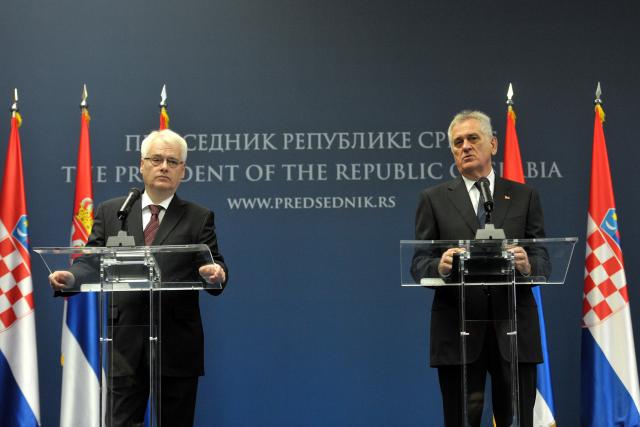



| Wednesday, 16 October 2013. | |
| Nikolić, Josipović: A new dimension in the Serbia-Croatia relations | |
| + larger fontnormal font- Smaller font | |||
 Permanent dialogue and resolution of outstanding issues – is the message sent out following the meeting of the two Presidents, Tomislav Nikolic and Ivo Josipovic, whose discussion focused primarily on the problems burdening the relations between the two countries. Permanent dialogue and resolution of outstanding issues – is the message sent out following the meeting of the two Presidents, Tomislav Nikolic and Ivo Josipovic, whose discussion focused primarily on the problems burdening the relations between the two countries.Nikolic said that both his Croatian colleague and he fully supported their Governments in the resolution of outstanding issues and the promotion of bilateral including economic cooperation, and underlined that Serbia was committed to improving its relations with Croatia, primarily because of the Serbian minority living in that country. Serbian President identified as the major problems in the relations between the two countries, primarily the inability to exercise the right to use the Serbian language and script; frequent security threats; references to Serbs in textbooks as occupiers and chetniks.... Nikolic also drew attention to ethnically motivated frictions and hate speech against Serbs, and that in some counties there were no schools for the Serbian national minority; that there was no desk for making programmes in Serbian, and that the situation was further exacerbated by the problem of the return of property to the Serbian Orthodox Church. "We would like to have an open and constructive dialogue....I am convinced that we have made a step forward towards improving the relations between Serbia and Croatia", Nikolic stated, attaching importance also to Croatia's support of Serbia's European integration process and the promotion of regional cooperation. Serbian President said that it was necessary to define a time-frame for addressing outstanding issues and that the Inter-State Commissions and Working Groups tasked with specific issues, should continue their work at an accelerated pace. Croatian President underlined that progress had been made in many areas, indicating that Serbia and Croatia could do better, but at the same time, he listed a number of problems in the relations between the two countries that made it necessary to settle the problem of missing persons, in the first place. "This problem is of primordial importance, both morally and legally", Josipovic said, indicating that the resolution of this issue was a prerequisite for settling the relations between the two countries, fully and once and for all. Josipovic said that Croatia was tracing 1,689 persons: 953 missing in the 1991-1992 period - predominantly Croats, and 736 missing in 1995 – predominantly Serbs, adding that the information about the missing persons was also available from sources in Serbia, and reiterated that this issue was the essential one. Josipovic noted that the two Governments were at a stalemate regarding the resolution of the border issue, saying that if the problem could not be resolved, a solution could be sought by applying Croatia's experience with Slovenia where the international legal mechanism was resorted to. "The border issue cannot remain outstanding for ever", stated Josipovic adding that Croatia was dissatisfied also with the manner in which the succession issue was being addressed. Josipovic said that similar problems to those facing the Serbian minority in Croatia - that Nikolic referred to - were shared by the Croatian minority in Serbia, but stressed in particular that the problem of refugees was common to both. Indicating a small number of Croatian refugees in Serbia, but that there were 40,000 Croat refugees who had fled Serbia, most of whom did not return, Josipovic said that in spite of "sharing with Nikolic their common concerns, they could be satisfied that progress had been achieved in many areas, which is an optimistic sign that both Serbia and Croatia can do better".
|